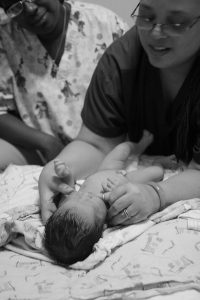Black Lives Matter
Black Mamas Matter
Black Births Matter
Black Midwives Matter
[originally published 4/27/2017; revised 6/18/2020]
CFAM recognizes the harm that systematic racism plays in health outcomes for Black mothers and babies. We believe that community midwifery care can be part of the solution to devastatingly high rates of infant and maternal mortality in Black communities. But in order for midwifery care to work for Black families, white midwives need to explore, accept and change their own implicit racial bias. Just as essential, we need to institutionally support training more Black midwives to serve Black families.
Black women die in childbirth at a rate 4 times higher than white women. Black women are not to be blamed for these devastating rates. Evidence shows that regardless of a Black woman’s age, level of education, diet or socio-economic status she still has a greater chance of dying in childbirth than a white women. Research is starting to show that stress due to racism, bias and discrimination have lasting and detrimental effects on black women’s reproductive health, pregnancies and long term health. Black women are not dying at higher rates because they don’t go to church, all live in poverty or have poor diets. If we truly want to place the blame anywhere, we should look at our health care system and the institutional racism that exists within it. We should take a look at our healthcare providers and how we treat women of color. And within the midwifery community, we must make it our business to do what we can to support birth workers of color, increase the reach of midwifery to communities who can benefit the most and create more midwives that represent and come from communities of color.
This is not a time to turn a blind eye, dismiss or ignore what is happening to black women and their babies. The time is now to openly and honestly discuss the impacts of racial discrimination on maternal care. We must look at and identify the social constructs that affect the health of black women over the course of their lifetime. We must start seeing and listening to black women when they tell of their experiences and treatment. We at CFAM believe if more families had access to midwifery care that it could make the difference. We know the midwifery model of care can provide respectful, high quality care. But we must be willing to check our own bias, acknowledge what we don’t know and educate ourselves in order to do the important work of providing care to the families we serve.
BLACK MIDWIVES SAVE LIVES
In tribute to Juneteenth 2020, CFAM gave $400 (~30% of our assets) to fund both Bay Area Black & indigenous families seeking community birth and Black Midwives Alliance. CFAM commits to annual contributions to increase access to BIPOC midwives prioritizing Black communities.
BLACK MIDWIVES MATTER
The Black Midwives Movement One answer to the higher rates of maternal and neonatal mortality among African Americans https://www.medpagetoday.com/nursing/nursing/85014
Black Lives Matter And MomsRising Want To Bring The Black Midwife Back
“Too often, Black pregnant women die from preventable complications … Integrating midwives into our primary health care system is an important way we can combat death during pregnancy and delivery … Black women have the power to reverse the stats by bringing back the midwife and sharing the impact of racial and gender biases on our health.” https://www.facebook.com/NowThisHer/videos/1270685383062334/
- National Black Midwives Alliance BlackMidwivesAlliance.org
- 2020 Black Bay Area Birth fund for Black and Indigenous families seeking community birth PayPal.me/blackbayareabirth https://docs.google.com/document/d/1B_SWLQcVlhMt-SNsp539uTCJmZ77djNd2WgAtqM56Ss/mobilebasic
Support Black apprentice midwives & birthworkers
- Asmara Gebre fund for Black midwives-in-training venmo @Asmara-Gebre https://www.instagram.com/asmara.gebre/
- Roots of Labor Birth Collective fund for Black birthworkers https://www.instagram.com/rootsoflaborbc/rootsoflaborbc.com
- Birth Justice Project Doulas for incarcerated people in San Francisco. FB/IG @BirthJusticeProject
- Sister Web – Black, Latinx, and Pacific Islander birth companion network sisterweb.org
- Ancient Song Doula Service Juneteenth Birthworker Seed Fund https://www.ancientsongdoulaservices.com/
- National Association to Advance Black Birth annual midwifery student scholarship program https://thenaabb.org/index.php/midwifrey-scholarship/
Advocates 4 Black Birth Justice
Black Mamas Alliance Fight to Give Life
“We define our common problem as “reproductive oppression” which is the control, exploitation and control of women, girls and individuals through our bodies, sexuality, labor, fertility and reproduction in violation of our human rights… Reproductive Justice absolutely centers our lived experiences and makes sure that not only are we working towards our own lives, but taht we are working to center the lives of those who are the most vulnerable… When black mamas win, we all win. We deserve a particular level of support from this country. Reparations, if you will. For us, reparations look like prenatal care.” Cherisse Scott, CEO SIsterReach
https://www.facebook.com/theRoot/videos/10158772087555231/
- Black Mamas Matter Alliance blackmamasmatter.org
- The National Association to Advance Black Birth https://thenaabb.org/index.php/donate-now/
- Black Women Birthing Justice blackwomenbirthingjustice.org
- Southern Birth Justice southernbirthjustice.org
- 4Kira4Moms.com
- California Black Women’s Health Project cabwhp.org
- Black Women for Wellness bwwla.org
- BirthEquity.org
Midwives Save Lives
Articles and videos
The Culture war between doctors vs midwives explained
Quick educational video on the longstanding culture war on maternal rights and midwifery https://www.facebook.com/Vox/videos/899792793541657/
Midwifery linked to better birth outcomes in state-by-state report cards
https://www.sciencedaily.com/releases/2018/02/180221180521.htm
“Given the long history of experimentation and past/present trauma African American and marginalized women have suffered with the advent of the modern American medical system, home birth can provide a psychologically safe environment that could be less traumatic. The benefits to marginalized women accessing home birth also include a reclaiming of their cultural and ethnic legacy. Reconnecting with home birth and a holistic approach to maternity care allows women to gain a deeper trust of themselves and their bodies.”
https://www.thelily.com/midwives-and-doulas-arent-a-luxury…/
A Larger Role for Midwives Could Improve Deficient U.S. Care for Mothers and Babies
New research shows improved birth outcomes are linked to access to and integration of midwives. The study highlights that access to midwives may decrease racial disparity in birth outcomes. In the US, maternal complications have more than doubled in the last 20 years. Shortages in maternity care have reached critical levels: nearly half of US counties don’t have a single OB/GYN.
https://www.propublica.org/article/midwives-study-maternal-neonatal-care
Safe for whom? Understanding how risk factors impact birth safety at home and birth centers
home and birth center birth may currently be a white middle class phenomenon in the United States not because women of color prefer hospital birth, but because they have been systematically excluded from choice in childbearing by larger structures of inequality.
Birthing Hope – a video on Birth Justice
Perspectives on risk: Assessment of risk profiles and outcomes among women planning community birth in the United States
research on risk factors in pregnancy in community birth settings like being over 35, having a body mass index over 30, or a breech positioned fetus, and examine how those factors influence risk.
https://onlinelibrary.wiley.com/doi/full/10.1111/birt.12288
How Racism Harms Pregnant Women and What Can Help
Ted talk by Miriam Zoila Perez
https://www.ted.com/talks/miriam_zoila_perez_how_racism_harms_pregnant_women_and_what_can_help
Racism is making people sick — especially black women and babies, says Miriam Zoila Pérez. The doula turned journalist explores the relationship between race, class and illness and tells us about a radically compassionate prenatal care program that can buffer pregnant women from the stress that people of color face every day.
How does access to Midwifery impact outcomes?
https://www.birthplacelab.org/mapping-collaboration-across-birth-settings/
Safe, Supported Birth: A Matter of Privilege? by Cristen Pascucci
https://improvingbirth.org/2013/07/privilege/
What police do to Black people, doctors do to Black women – Lydia Elle @iamlydiaelle
What it’s like to be black and pregnant when you know how dangerous that can be By Dani McClain
This firsthand account of pregnancy through the eyes of a black reporter touches on many needs of black women, including access to care providers who can be trusted to provide culturally competent care, as well as the importance of midwives, doulas and doctors of color.
What My First Pregnancy Taught Me About Birth Justice
https://rewire.news/article/2016/05/24/first-pregnancy-birth-justice/
The medical community needs to do more to support women of color, particularly Black women, who must confront a number of hurdles in order to have a vaginal birth after cesarean. So important to dispel the misinformation around VBAC and ensure that options such as using a midwife, are available for all women who choose to VBAC.
Racial Stress Impacts Pregnancy for Black Women
Heart & Soul Magazine
http://www.heartandsoul.com/racism-impacts-pregnancy-for-black-women/
This is an easy to digest article that tells the facts in a concise way for a layperson.
How Racism Impacts Pregnancy Outcomes
http://www.unnaturalcauses.org/video_clips_detail.php?res_id=70
UCLA obstetrician and gynecologist Dr. Michael Lu believes that for many women of color, racism over a lifetime, not just during the nine months of pregnancy, increases the risk of preterm delivery. To improve birth outcomes, Lu argues, we must address the conditions that impact women’s health not just when they become pregnant but from childhood, adolescence and into adulthood.
Unraveling the Mystery of Black-White Differences In Infant Mortality
https://www.youtube.com/watch?v=TJK9cL0BE4Q
This clip is excerpted from “When the Bough Breaks,” Episode 2 of “UNNATURAL CAUSES: Is Inequality Making Us Sick?”
American medicine was built on the backs of slaves. And it still affects how doctors treat patients today
“We must address the ways racism and slavery shaped American medicine, not only to right past wrongs but also to confront how that influence continues to affect how patients are treated today. The systematic influence of institutional racism on American medicine goes far beyond any individual physician.”
The US Medical system is haunted by slavery
https://www.vox.com/health-care/2017/12/7/16746790/health-care-black-history-inequality
A shocking number of women are harassed, ignored, or mistreated during childbirth
https://www.vox.com/2019/6/10/18628073/maternal-mistreatment-women-of-color
“The first quantitative study to examine mistreatment during childbirth in the US was recently published in the journal Reproductive Health. The researchers found 17 percent of the 2,700 women surveyed — or one in six — reported experiencing one or more types of mistreatment, such as verbal abuse, stigma, and discrimination, and having requests for help ignored.
The rates of mistreatment were even higher for certain racial groups: Indigenous women were most likely to report being mistreated (33 percent), followed by Hispanic women (25 percent) and black women (23 percent). Fourteen percent of white women reported being mistreated. Women who gave birth in hospitals, who were 24 years old or younger and lower income, reported higher rates of mistreatment.”
What’s Behind the Increased Numbers of Black Women Dying During Pregnancy and Childbirth in the United States?
Deadly Delivery:The Maternal Health Care Crisis in the USA
On March 12, 2010, Amnesty International issued a report entitled Deadly Delivery: The Maternal Health Care Crisis in the USA, which documented that although the United States spends more on health care than any other country, it ranked 41st (at the time of publication) in terms of maternal death.”
Persistent Peril: Why African American babies have the highest infant mortality rate in the developed world By Ziba Kashef, ColorLines RaceWire
Chronic emotional stress results from many factors, including physically demanding jobs and a lack of control in the workplace, single parenthood, and financial worries–all problems experienced disproportionately by women of color. Discrimination is also a documented source of harmful stress. One study found that women who gave birth to very low birth weight babies were more likely to have experienced racial discrimination than women who had normal weight babies.
Very Low Birthweight in African American Infants: The Role of Maternal Exposure to Interpersonal Racial Discrimination
https://www.ncbi.nlm.nih.gov/pmc/articles/PMC1448603/
Our study adds to the small but growing evidence of a relation between African American women’s exposure to interpersonal racial discrimination and pregnancy outcomes.
Racial Disparities in Birth Outcomes and Racial Discrimination as an Independent Risk Factor Affecting Maternal, Infant, and Child Health
https://mana.org/pdfs/ExecutiveSummary-Race-2015.pdf
https://mana.org/healthcare-policy/racial-disparities-in-birth-outcomes
This paper was sponsored by the International Center for Traditional Childbearing, the International Cesarean Awareness Network, the Midwives Alliance of North America, and Elephant Circle. It’s a summary of relevant research.
What’s Killing America’s Black Infants. By Zoe Carpenter https://www.thenation.com/article/whats-killing-americas-black-infants/
An insightful look into the disproportionate mortality in black infants related to lifelong racial discrimination and the stress it causes to black women.
Perinatal Disparities: Not Just Black and White ~ Part One by Darline Turner Lee https://www.scienceandsensibility.org/p/bl/et/blogid=2&blogaid=389
Perinatal Disparities: Not just Black and White- Part Two by Darline Turner-Lee
https://www.scienceandsensibility.org/blog/perinatal-disparities-not-just-black-and-white-part-two
These articles discuss the results of a study and consider the multiple factors that cause disparities in maternity outcomes.
Disparities in Access and Outcomes of Maternity Care
http://transform.childbirthconnection.org/blueprint/disparities/
This includes action steps to improve outcomes.
In Oakland, black women and their babies face much worse health outcomes
Deadly delivery: how childbirth in America is becoming more dangerous
Trends in Differences in US Mortality Rates Between Black and White Infants
“The study found the single largest contributor to the widening infant mortality gap was the preterm birth rate, which is nearly 50 percent higher for black infants than it is for white infants.
The team claimed 60 percent of the mortality rate among black infants was preventable and would not occur in white communities. They estimated that nearly 4,000 black infants who died in their first year could have been saved if they had access to the same healthcare as white babies.
“We have values of social equality, that people should have equal life chances and equal opportunities and equal access to basic human rights like medical care and the right to have a healthy pregnancy, and these kinds of observations about these tremendous inequalities are evidence that we’re far from that goal,” Kaufman said.”
Original study published 7/3/17:https://jamanetwork.com/journals/jamapediatrics/fullarticle/2633490?alert=1
Racial disparity in US infant mortality increasing – study
https://www.rt.com/usa/395199-racial-gap-infant-mortality-rates/
Infographic: Racial/Ethnic Disparities in Pregnancy-Related Deaths
Pregnancy-related mortality rates are as much as 4 times higher for Black women as they are for white women.
Infant mortality rates by race: California, 2015-2017 Average
https://www.marchofdimes.org/Peristats/ViewSubtopic.aspx?reg=06&top=6&stop=94&lev=1&slev=4&obj=1
Infant mortality is 2.3 times higher for black babies than white babies.


